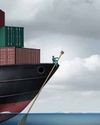Denemek ALTIN - Özgür
Container Logistics Cost: Myth Vs Facts
Maritime Gateway
|April 2020
India’s logistics cost is high and there are several elements in the logistics chain which add to the logistics cost. Sunil K. Vaswani, Executive Director, Container Shipping Lines Association (INDIA) brings to the fore some of them

While on the one hand, India aspires to be a USD 5 trillion economy by 2024-25, on the other, it's cost of logistics remains high at 14 per cent of the GDP, as compared to 8/9 per cent in the case of the developed economies of the world. The reasons for these are varied, some of which are commonly known while the others, although equally important if not more, are not generally talked about.
Here are some of the spots where the shoe really pinches:
HIGH PORT CHARGES
India's port charges remain amongst the highest in the world.
TOTAL PORT CALL COST of a vessel of the same size calling at Indian ports viz-a-viz the foreign ones – The Vessel Related Charges at Indian ports are far higher than those at Foreign ports. Vessel related charges work out to $108,437 at the New Terminals at Nhava Sheva ie BMCT / NSIGT & $64,592 at the Old Terminals at Nhava Sheva ie JNPCT / GTI / NSICT, as compared to $12,043 at P Klang, $16,158 at Jebel Ali, $17,235 at Singapore & $19,308 at Colombo. These charges at Indian ports will increase even further if the tariffs are revised.
TOTAL CONTAINER RELATED
COST – These costs too are much higher at the New Nhava Sheva Terminals (BMCT & NSIGT), Mundra & Pipavav, as compared to those at Foreign ports. Again, these costs at Indian ports could increase further, including the ones at the Nhava Sheva old terminals, should the Indian ports go ahead with a revision in their tariffs.
UNIT COST PER MOVE – Even at the existing rates, the UNIT COST PER MOVE, works out much higher (approximately double or even almost triple the cost) for a vessel calling at Indian ports, as compared to her calling at Foreign ports.
Bu hikaye Maritime Gateway dergisinin April 2020 baskısından alınmıştır.
Binlerce özenle seçilmiş premium hikayeye ve 9.000'den fazla dergi ve gazeteye erişmek için Magzter GOLD'a abone olun.
Zaten abone misiniz? Oturum aç
Maritime Gateway'den DAHA FAZLA HİKAYE

Maritime Gateway
Impact Of Covid-19 On Shipping And Logistics
Industry stalwarts discuss threadbare the prevailing logistics and supply chain scenario and issues in clearing cargo during the COVID-19 lockdown
15 mins
May 2020

Maritime Gateway
Digital Platforms Defy Lockdown
Digital trading modules such as eNAM are enabling farmers to move their produce from farm to market even during the lockdown
4 mins
May 2020

Maritime Gateway
GARMENT TRADE TRAMPLED
As retailers face a shutdown in US and Europe, the cascading affect has caused mass cancellation of orders in Bangladesh
2 mins
May 2020

Maritime Gateway
TRADE RESUMES WITH CHINA
While India has allowed uninterrupted movement of imports into Nepal even during lockdown, China is reopening its borders as it emerges from the pandemic
2 mins
May 2020
Maritime Gateway
LESS HUMAN INTENSIVE, MORE DATA DRIVEN
AI provides transformational opportunity for logistics industry by improving customer experience, operational efficiency, faster turnaround time and lower cost while ensuring security and transparency. Macro environment requires industry to transform to be less human intensive, agile and data driven, all of which can be accelerated by AI adoption, shares Gangadhar Gude, Founder & CEO, atai.ai
6 mins
May 2020

Maritime Gateway
SHAKEN AND STIRRED
The COVID-19 pandemic has partially paralysed the logistics and supply chain, but the industry is still deterred to ensure supply of essentials continues
9 mins
May 2020

Maritime Gateway
TRADE STUCK, ECONOMY SLOWS DOWN
Sri Lankan economy slows down as trade deficit widens and supply chain disrupts amidst lockdown
2 mins
May 2020

Maritime Gateway
LENDING INTELLIGENCE TO SUPPLY CHAIN
If you’re shipping millions of dollars’ worth of pharmaceuticals, high-end electronics, expensive seafood, or precious metals, what would you be willing to pay for the ability to ‘ask’ your shipment where it is right now and whether it’s ok? What would you pay for a freight smart enough to raise an alarm before it spoils? Artificial Intelligence enables that and much more…
15 mins
May 2020

Maritime Gateway
CONTAINER LINES SIGNAL ‘SOS'
As the per-unit cost of operations increases many lines are forced to blank sailings which has hit their bottom line real hard. The Government and Terminal Operators therefore need to actively consider reduction in Vessel Related Costs
2 mins
May 2020

Maritime Gateway
IMO 2020 And The Covid-19 Curse
The COVID-19 outbreak has shaken and stirred the already volatile bunker market. While the refiners adjust their capacities and shipping lines choose their path to compliance, the market dynamics are yet to reach an equilibrium
12 mins
April 2020
Translate
Change font size

